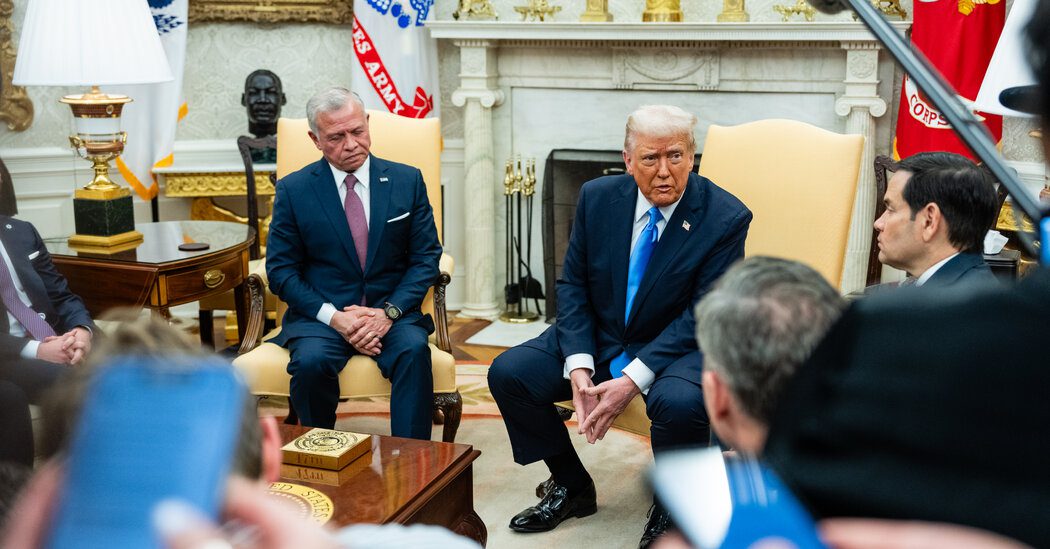
Nations Respond to Trump’s Steel and Aluminum Tariffs, Marking a Tense Trade Climate
On Tuesday, countries impacted by President Trump’s recently announced tariffs on steel and aluminum labeled the measures as unfair, signaling a potential escalation in a trade conflict that may disrupt economic markets and challenge the United States’ relations with key allies.
Justin Trudeau, Prime Minister of Canada and the foremost exporter of metals to the U.S., criticized Trump’s proposed 25% tariffs on imports, branding them as “unjustified” and “unacceptable.” The Canadian leader expressed a desire to prevent the implementation of these tariffs, set to take effect on March 12, by emphasizing the detrimental effects they would have on both American and Canadian economies.
Trudeau confirmed Canada’s intention to collaborate with international allies to influence the Trump administration’s decision-making. When asked about the possibility of retaliatory tariffs, he stated, “Canada will stand up strongly and firmly if we need to.”
European leaders echoed similar sentiments, with Ursula von der Leyen, president of the European Commission, describing the tariffs as “unjustified.” Mexican officials labeled the tariffs as “unjustifiable,” raising concerns about the potential harm to the North American economic integration achieved over the last few decades.
Marcelo Ebrard, Mexico’s Secretary of the Economy, stated that he would appeal to Trump’s sense of reason in hopes of avoiding the tariffs. Noting that the U.S. enjoys a trade surplus with Mexico in the steel and aluminum sectors, Ebrard emphasized the importance of maintaining established economic relationships. "We take his word for it—common sense—avoiding harm to what we’ve built over the past 40 years," he remarked.
The surprise announcement of these tariffs by Trump caught Canadian and Mexican leaders off guard. Recently, he had hinted at implementing 25% tariffs on all imports from both nations, prompting strong warnings of retaliation. However, a last-minute agreement had previously postponed these tariffs for 30 days, including enhanced security measures at the U.S. borders with both countries.
The abrupt reintroduction of tariffs on Canadian steel and aluminum has left political and business leaders feeling disoriented, particularly given Canada’s significantly smaller economy, which would be adversely affected. This renewed tension is likely to exacerbate Canada’s distrust of the Trump administration and intensify feelings of betrayal among Canadians, accelerating discussions about strengthening ties with other nations.
On Sunday, while en route to the Super Bowl, Trump confirmed his readiness to impose these tariffs. In 2024, Canada was the leading supplier of steel to the U.S., followed by Mexico and Brazil, and it remains a crucial source of aluminum.
The Canadian steel industry employs 23,000 workers, with nearly all exports directed to the United States, as demand in alternative markets remains limited. Canada’s aluminum sector is somewhat more competitive worldwide and employs 9,000 individuals, primarily relying on the U.S. as its key market.
During Trump’s first term, tariffs on global steel and aluminum imports drew ire from Canada, Mexico, and other allies, culminating in exemptions for several major steel-producing nations in exchange for export quotas. These measures were lifted following the establishment of a revised trade agreement among the three nations.
This time, Trump has coupled his tariff threats with discussions of annexing Canada, suggesting it could become the 51st state. Initially dismissing these comments, Trudeau later acknowledged the seriousness of the threat during a discussion with business leaders.
At a conference on artificial intelligence in Paris, Trudeau asserted, “This is a moment of pride. This is a time for Canada to stand firm in our identity,” in response to Trump’s remarks.
In 2024, Mexico ranked as the third-largest supplier of steel to the United States. A representative from Canacero, the Mexican steel trade association, indicated that the association would closely monitor the tariffs’ potential impact on its domestic industry, which focuses on producing steel for a variety of sectors, including automotive and construction.
When tariffs were introduced during Trump’s first term, Mexico responded with counter-tariffs on significant American products such as pork, cheese, and motorcycles. Such retaliatory measures could be anticipated once again if conditions remain unchanged.
While the earlier tariffs didn’t bring substantial benefits to American manufacturers, analysts suggest Trump might be revisiting them due to their political appeal. “It represents a straightforward win for Trump to communicate,” remarked Valeria Moy, director of the Mexican Institute for Competitiveness. She noted it primarily supports an industry seen as emblematic of American manufacturing.
Brazil, exporting $4.5 billion worth of steel to the U.S. last year, had largely remained exempt from Trump’s initial tariffs due to the trade surplus enjoyed by the United States with Brazil. Experts warn that reinstating tariffs could negatively impact the U.S. coal industry, highlighting the interconnectedness of these economies.
Ebrard concluded, “This situation might create leverage for Brazil in negotiations, as decreased steel production would consequently reduce the demand for American coal.”









